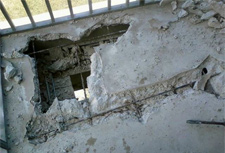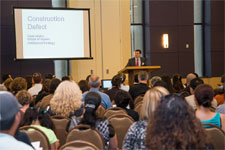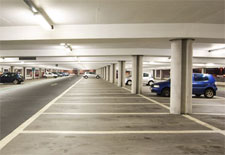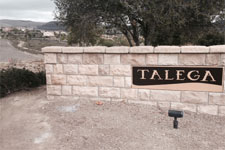|
|
|
|
|
Community Association Update / Issue # 26
Annual Legislative & Case Law Update (2015)
|
|
Legislative & Case Law Update (2015): Introduction
Happy New Year! Below you will find an overview of the 2014 legislation and case law impacting California community associations as we head into 2015. The material below is not meant to be an exhaustive list of all new legislation and case law; we have summarized what we believe is the most important to the majority of our community association clients and the industry professionals who service them. If you have any questions regarding the items below, please feel free to contact our offices anytime! | |

| Sincerely,
Steven J. Tinnelly, Esq.
|
|
AB 1738: Member Attorneys at IDR Proceedings
Member now given the right to have their attorneys present at IDR; Effective 01/15

Existing law requires HOAs to "provide a fair, reasonable, and expeditious procedure for resolving a dispute" between a HOA and its members. This procedure is commonly referred to as "Meet and Confer" or "Internal Dispute Resolution" ("IDR"). Its purpose is to provide a non-adversarial forum where a HOA member and a HOA Director can meet informally to see if a resolution to a dispute can be secured short of involving attorneys and taking legal action.
AB 1738, effective January 1, 2015, may serve to upset this non-adversarial structure through providing a member with the right to have the member's attorney present at IDR. The primary opposition to AB 1738 has been premised upon the concern that it will result in HOAs having to incur more attorney's fees by having their attorneys attend IDR where a member brings his or her attorney.
**For more information, click here to read our blog post on AB 1738.
|
AB 968: Maintenance/Repair of Exclusive Use Common Area
Clarifies member vs. HOA maintenance/repair responsibilities; Effective 01/17

Where CC&R provisions governing the maintenance/repair responsibilities for common areas are unclear, Civil Code Section 4775(a) sets forth a default structure. However, there is an ambiguity within the language of Section 4775 with regard to exclusive use common area. While Section 4775 addresses the maintenance of exclusive use common area, it fails to state exactly who is responsible for "repairing" or "replacing" the exclusive use common area (the homeowner or the HOA). This ambiguity is often problematic for condominium developments that may have numerous exclusive use common areas, such as windows, reserved parking spaces, patios, balconies, etc.
Industry practice has held that the homeowner is only responsible for the basic upkeep/maintenance of the exclusive use common area's usable surfaces, while the HOA would be responsible for any major or structural repairs or replacements. AB 968, effective January 1, 2017, will serve to codify industry practice by amending Section 4775 to state that HOAs are indeed responsible for the repair and replacement of exclusive use common areas absent provisions in their governing documents to the contrary.
**For more information, click here to read our blog post on AB 968.
|
AB 2188: HOA Regulation of Solar Energy Systems
Increases the limitations on a HOA's ability to regulate solar energy systems; Effective 01/15

Existing law prohibits HOAs from prohibiting or restricting the use of solar energy systems (i.e., solar panels). However, HOAs do have the authority to place "reasonable restrictions" on the use of a solar energy system. "Reasonable restrictions" are those which do not "significantly increase the costs of the system or significantly decrease its efficiency or specified performance." The thresholds of what constituted a "significant" cost increase or performance decrease were previously set by statute at $2,000 or 20%, respectively.
AB 2188, effective January 1, 2015, cuts these thresholds in half to now be $1,000 and 10%. AB 2188 will therefore serve to reduce HOAs' already limited authority to regulate the installation of solar energy systems in their communities.
**For more information, click here to read our blog post on AB 2188.
|
AB 2104: Low-Water Using Plants; Watering During Droughts
HOAs prohibited from fining homeowners for failing to water during droughts; Effective 01/15

AB 2104, effective January 1, 2015 will expand upon the limitations placed upon HOAs in their efforts to regulate "low water-using plants," as well as incorporate an Executive Order signed by Governor Brown in April of 2014 that prohibits HOAs from fining homeowners for reducing/eliminating the watering of lawns during declared drought periods.
Section 4735 of the California Civil Code previously stated that any provision of a HOA's governing documents is void and unenforceable to the extent that it "prohibits, or includes conditions that have the effect of prohibiting, the use of low-water using plants as a group." AB 2104 will expand on this language by also voiding any governing document provision (including those contained in a HOA's architectural or landscaping guidelines) that "prohibits, or includes conditions that have the effect of prohibiting, the use of low-water using plants as a group or as a replacement for existing turf." (Emphasis added.) Additionally, the inability for HOAs to fine homeowners for failing to adequately water vegetation or lawns during state or local government declared drought periods will be codified under new subpart (c) to Section 4735.
**For more information, click here to read our blog post on AB 2104.
Related to AB 2104 is SB 992. SB 992, effective January 1, 2015, still allows HOAs to fine homeowners for failing to water during drought periods where the HOA uses "recycled water" for "landscape irrigation." The language used in allowing this exception is vague and questions have surfaced regarding the amount of recycled water the HOA must use in order to qualify for the exception. SB 992 also renders void and unenforceable any provision of a HOA's governing documents that requires a homeowner to pressure wash the exterior of his unit or exclusive use common area during state or local government declared drought periods.
|
AB 2430: Transfer Disclosure Documents
Seller pays fees for Transfer Disclosure Documents; other changes; Effective 01/15

Existing law sets forth the responsibility of HOAs to provide copies of governing documents, financial disclosures and other documents to a homeowner (or a homeowner's authorized agent) within ten (10) days of a receipt of a request for those documents. This applies in the context of a sale of a property (a unit or lot) within a HOA. The documents to be produced are identified in Civil Code Section 4525, and are commonly known as "Transfer Disclosure Documents."
Civil Code Section 4530 does provide a HOA with the right to "collect a reasonable fee" based upon its efforts in producing, preparing and delivering Transfer Disclosure Documents. AB 2430, effective January 1, 2015, has amended Section 4530 to specify the seller's obligation to compensate the association for the aforementioned fee. Other notable changes in the law that will result from AB 2430 include:
- The HOA must provide an estimate of the fees that will be assessed in producing the Transfer Disclosure Documents, prior to producing them.
- The fees must be "separately stated" and "separately billed" from all other fees, fines or assessments that are billed as part of the transaction.
- If the seller is in possession of any Transfer Disclosure Documents, the seller is required to provide copies to the prospective purchaser at no cost.
- The form used for estimating the fees, as described in Civil Code Section 4528, is amended to include the following within the rightmost column of the form: "Not Available (N/A), Not Applicable (N/App), or Directly Provided by Seller and confirmed in writing by Seller as current document (DP)."
**For more information, click here to read our blog post on AB 2430.
|
AB 2561: Personal Agriculture
Homeowners may plant personal use food gardens in their backyards; Effective 01/15

AB 2561, effective January 1, 2015, allows homeowners within HOAs to plant personal use food gardens in their backyards regardless of any restrictions contained in a HOA's governing documents to the contrary. However, AB 2561 does not authorize crops to be grown for commercial purposes or to be sold on the property, nor does it authorize the growing of non-food crops or marijuana. Additionally, AB 2561 allows for HOAs to adopt reasonable restrictions (i.e., rules) on the maintenance standards of gardens.
**For more information, click here to read about AB 2561 online.
|
Huntington Continental Townhouse Assn. v. Miner (2014)
HOAs required to accept partial payments from delinquent homeowners.

Once a delinquent file is forwarded to a HOA's collection company or law firm, industry practice has been to reject any partial payments made by the delinquent homeowner (i.e., to reject any payments that do not cover all of the delinquent assessment amount, including late fees, interest, collection costs, etc.) that have accrued on the homeowner's account. That approach has been based upon the language set forth in Civil Code Sections 5655 and 5720 which places limitations on a HOA's ability to enforce an assessment lien through foreclosure, as well as places requirements on how assessment payments must be allocated to the outstanding delinquent amounts.
Under those provisions, a homeowner making a series of partial payments could structure a way in which to avoid foreclosure of his property while not paying any or all of the amounts necessary to reimburse the HOA for the collection fees and costs it has incurred in connection with the homeowner's delinquency. Thus, HOA collection companies and firms have traditionally rejected partial payments in order to avoid this problem--especially in light of the absence of any language in the Civil Code explicitly requiring HOAs to accept partial payments.
However, the decision in Huntington Continental Townhouse Association, Inc. v. Miner (2014) ("HTCA") now clarifies that HOAs do have an affirmative obligation to accept partial payments. This will result in a major shift in the collection practices which have been traditionally utilized by HOA collection companies and firms.
**For more information, click here to read our blog post on HTCA.
|
Seahaus La Jolla Owners Assn. v. La Jolla View LTD (2014)
Clarifies attorney-client privilege in the context of construction defect litigation.

Civil Code Section 6150 requires that a HOA make various disclosures to its membership in the context of construction defect litigation. The HOA is further required to hold a meeting of its membership to "discuss problems that may lead to the filing" of a construction defect action, as well as the options available to the members to address those problems.
Such a meeting will likely involve communications between the HOA's construction defect attorney and individual members of the HOA whom are not the attorney's direct clients. Therefore, the extent to which those communications are protected by the attorney-client privilege may be uncertain. Fortunately, the recent case of Seahaus La Jolla Owners Association v. La Jolla View LTD (2014) ("Seahaus") addressed this issue and clarified the privileged nature of communications between a HOA's attorneys and its membership in the context of construction defect litigation. In sum, the court in Seahaus concluded that the HOA's attorney's communications with the HOA's membership were privileged and were not discoverable by the defendant developer.
**For more information, click here to read our blog post on Seahaus.
|
Market Lofts Community Assn. v. 9th Street Market Lofts, LLC (2014)
HOA has standing to sue developer over parking rights of the HOA's members.

It is not uncommon for a HOA to enter into contractual arrangements with a third party where the rights and responsibilities under that arrangement are between the third party and each of the HOA's members. Under such circumstances, the HOA's involvement may be limited solely to collecting fees from the members and passing them on to the third party. Because the HOA (as an entity) is not the beneficiary of the contract, there is uncertainty as to whether the HOA has standing to assert claims against the third party on behalf of the HOA's members.
California Civil Code Section 5980 provides a HOA with standing to initiate legal action "in its own name as the real party in interest and without joining with it the [HOA's] members" in matters relating to enforcement of the HOA's governing documents, as well as matters involving or arising out of damage to the common area and/or to a separate interest which the HOA is obligated to maintain or repair. However, there is no statutory provision clearly addressing whether a HOA has such standing in matters pertaining to the rights of the HOA's members in contracts with third parties.
Fortunately, the case of Market Lofts Community Association v. 9th Street Market Lofts, LLC (2014) ("Market Lofts") provides guidance on this issue. In sum, the Court in Market Lofts held that even where a HOA itself suffers no direct injury, it may still have representative standing to bring an action on behalf of its members.
**For more information, click here to read our blog post on Market Lofts.
|
Beacon Residential Community Assn. v. Skidmore, Owings & Merrill LLP (2014)
Architect owes a duty of care to future homeowners.

In February of 2013, the California Court of Appeal held in Beacon Residential Community Association v. Skidmore, Owings & Merrill LLP et. al ("Beacon") that the defendant architects owed a duty of care in the performance of their design services so as to avoid foreseeable injury to third parties (including the HOA and its members). We blogged about that ruling in 2013.
The ruling was then appealed to the California Supreme Court. In 2014, the Supreme Court affirmed the Court of Appeal's decision, holding that an architect does owe a duty of care to future homeowner where the architect is the principal architect on the project, even if the architect does not actually build the project or exercise ultimate control over the project's construction decisions. The architect could thus be held liable for any injury sustained to future homeowners that result from the architect's negligence in performing its services.
**To read the Supreme Court's ruling in Beacon, click here.
|
Talega Maintenance Corporation v. Standard Pacific Corporation (2014)
Statements made during Board meetings by Developer Reps. were not constitutionally protected speech.

In Talega Maintenance Corporation v. Standard Pacific Corporation (2014) ("Talega"), the Court of Appeal denied a developer's anti-SLAPP motion filed to defeat the HOA's action against is developer, and the members of the HOA's Board which the developer appointed. The HOA alleged breach of fiduciary duty, fraud, and negligence against the developer and its Board representatives regarding their failure to repair common area trails and claims at Board meetings that the HOA was responsible for the repairs.
The developer's anti-SLAPP motion was intented to strike the HOA's causes of action, claiming that the matters arose out of constitutionally protected statements made at Board meetings. The Court disagreed-holding that the alleged fraudulent statements by the developer's representatives did not satisfy the requirements for an anti-SLAPP motion, since the statements were not matters of "public interest" nor "official proceedings" that are entitled to constitutional protection under the anti-SLAPP statutes.
**To read the Court's holding in Talega, click here.
|
|

We are pleased to share that 2014 was another year of growth and expansion for Tinnelly Law Group. In addition to the approximately 50 new clients that we began working with, we welcomed a new Director of Business Development and new Attorney to our team. We also opened up a satellite office in downtown Los Angeles to better service our growing LA County client portfolio.
Additionally, our collection affiliate, Alterra Assessment Recovery, has continued to grow and provide incredible results for its clients since its launch in 2013. Both TLG and Alterra reached new milestones in 2014, and both companies are poised to continue their success and growth into 2015.
2015 promises to be another exciting year. TLG will be relocating its headquarters into a brand new, larger space located in South Orange County to keep pace with growth and to continue to improve upon the firm's service offering and standards. TLG also has some major announcements set for later in the year---keep a look out for more to come!
We would like to thank our clients and industry partners for their continued support as we head into a very busy 2015!
|
|
|
|
|
|
Community Association Update - Issue #26
Annual Legislative & Case Law Update (2015)
NOTICE: The information contained in the Community Association Update is for educational and informational purposes only and does not constitute legal advice, nor is it meant to create an attorney-client relationship.
|
 Corporate Headquarters: Corporate Headquarters:
30 Enterprise - Suite 320
Aliso Viejo, CA 92656
P: 949.588.0866
F: 949.588.5993
contact@tinnellylaw.com
| |
Orange County | Los Angeles | San Diego | Riverside County | San Francisco Bay Area
|
|
|